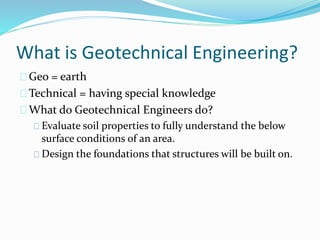About Geotheta
About Geotheta
Blog Article
How Geotheta can Save You Time, Stress, and Money.
Table of ContentsAn Unbiased View of GeothetaGeotheta - An Overview9 Easy Facts About Geotheta ShownHow Geotheta can Save You Time, Stress, and Money.The smart Trick of Geotheta That Nobody is Discussing

They conduct website investigations, accumulate samples, execute lab tests, and analyze data to review the viability of the ground for construction projects - Geo Tech Engineering. Based on their searchings for, geotechnical engineers provide recommendations for foundation layout, incline security, retaining frameworks, and mitigation of geotechnical hazards. They work together with various other specialists, such as engineers, architectural engineers, and construction groups, to make certain that geotechnical considerations are integrated into the overall job layout and application
By analyzing the actions and residential or commercial properties of dirt and rock, they can identify prospective geotechnical hazards such as landslides, dirt negotiation, or slope instability. Their competence helps stop failings or mishaps that might endanger lives and building. Right here are some detailed responsibilities and duties of a geotechnical designer: Website Investigation: Geotechnical engineers conduct site examinations to collect information on subsurface conditions.
They translate the data to understand the properties and behavior of the soil and rock, including their stamina, permeability, compaction characteristics, and groundwater conditions. Geotechnical Evaluation and Design: Geotechnical designers assess the data gathered during website investigations to evaluate the stability and suitability of the site for building and construction projects. They carry out geotechnical estimations and modeling to assess factors such as birthing capacity, settlement, slope security, lateral planet stress, and groundwater circulation.
Not known Factual Statements About Geotheta
Foundation Design: Geotechnical engineers play a crucial role in making structures that can securely support the desired structure. They analyze the soil problems and tons demands to establish the appropriate foundation kind, such as shallow foundations (e.g., grounds), deep structures (e.g (https://www.intensedebate.com/people/geotheta)., piles), or specialized methods like soil improvement. They take into consideration aspects such as settlement limits, bearing ability, and soil-structure communication to create optimum foundation designs
They examine building plans, screen website tasks, and perform field inspections to confirm that the design suggestions are followed. If unpredicted geotechnical concerns arise, they evaluate the situation and provide recommendations for removal or adjustments to the design. Risk Analysis and Reduction: Geotechnical engineers analyze geotechnical hazards and dangers connected with the project website, such as landslides, liquefaction, or dirt erosion.

Partnership and Communication: Geotechnical designers work very closely with various other specialists involved in a project, such as engineers, architectural designers, and construction teams. Reliable interaction and cooperation are necessary to incorporate geotechnical considerations right into the total project layout and building and construction procedure. Geotechnical designers give technological knowledge, solution questions, and ensure that geotechnical demands are met.
Excitement About Geotheta
Here are some kinds of geotechnical engineers: Foundation Designer: that site Structure engineers concentrate on developing and analyzing foundations for structures. They assess the soil problems, load requirements, and website qualities to determine one of the most ideal foundation type and design, such as superficial foundations, deep foundations, or specialized techniques like heap structures.
They examine the factors influencing incline stability, such as soil properties, groundwater problems, and slope geometry, and create methods to prevent slope failings and mitigate dangers. Earthquake Designer: Quake designers specialize in analyzing and designing frameworks to withstand seismic forces. They analyze the seismic danger of a website, assess dirt liquefaction possibility, and establish seismic style criteria to make certain the security and strength of structures during quakes.
They perform area testing, gather samples, and assess the gathered information to identify the dirt properties, geologic developments, and groundwater conditions at a site. Geotechnical Instrumentation Designer: Geotechnical instrumentation engineers concentrate on surveillance and gauging the habits of soil, rock, and structures. They mount and preserve instrumentation systems that monitor variables such as dirt negotiation, groundwater levels, incline motions, and structural displacements to analyze performance and give very early warnings of potential problems.
The Main Principles Of Geotheta
They perform examinations such as triaxial examinations, consolidation tests, straight shear tests, and leaks in the structure examinations to gather information for geotechnical evaluation and style. Geosynthetics Designer: Geosynthetics designers specialize in the style and application of geosynthetic materials, such as geotextiles, geogrids, and geomembranes. They use these products to boost soil security, reinforce inclines, provide drain remedies, and control erosion.
They often tend to be investigatory individuals, which implies they're intellectual, introspective, and investigative. They are curious, systematic, reasonable, analytical, and logical. Some of them are likewise social, suggesting they're kind, generous, participating, person, caring, useful, compassionate, skillful, and pleasant - Engineer of Record.
In the workplace setting, geotechnical engineers utilize specialized software tools to perform estimations, produce styles, and analyze information. They prepare records, evaluation job requirements, communicate with customers and staff member, and coordinate task tasks. The office setup supplies a conducive atmosphere for research, evaluation, and collaboration with other experts associated with the job.
How Geotheta can Save You Time, Stress, and Money.
They frequently visit task websites to carry out site examinations, evaluate geotechnical conditions, and gather data for evaluation. These gos to include taking a trip to various locations, sometimes in remote or difficult surfaces. Geotechnical engineers may perform soil tasting, conduct examinations, and display building activities to guarantee that the geotechnical elements of the task are being executed properly.
Geotechnical engineers also operate in specialized geotechnical laboratories. In these facilities, they carry out experiments, execute examinations on dirt and rock samples, and analyze the design residential properties of the materials. Geotechnical research laboratory designers work thoroughly in these settings, managing testing equipment, running tools, and tape-recording data. They team up with other lab team to ensure accurate and trustworthy testing outcomes.
Report this page